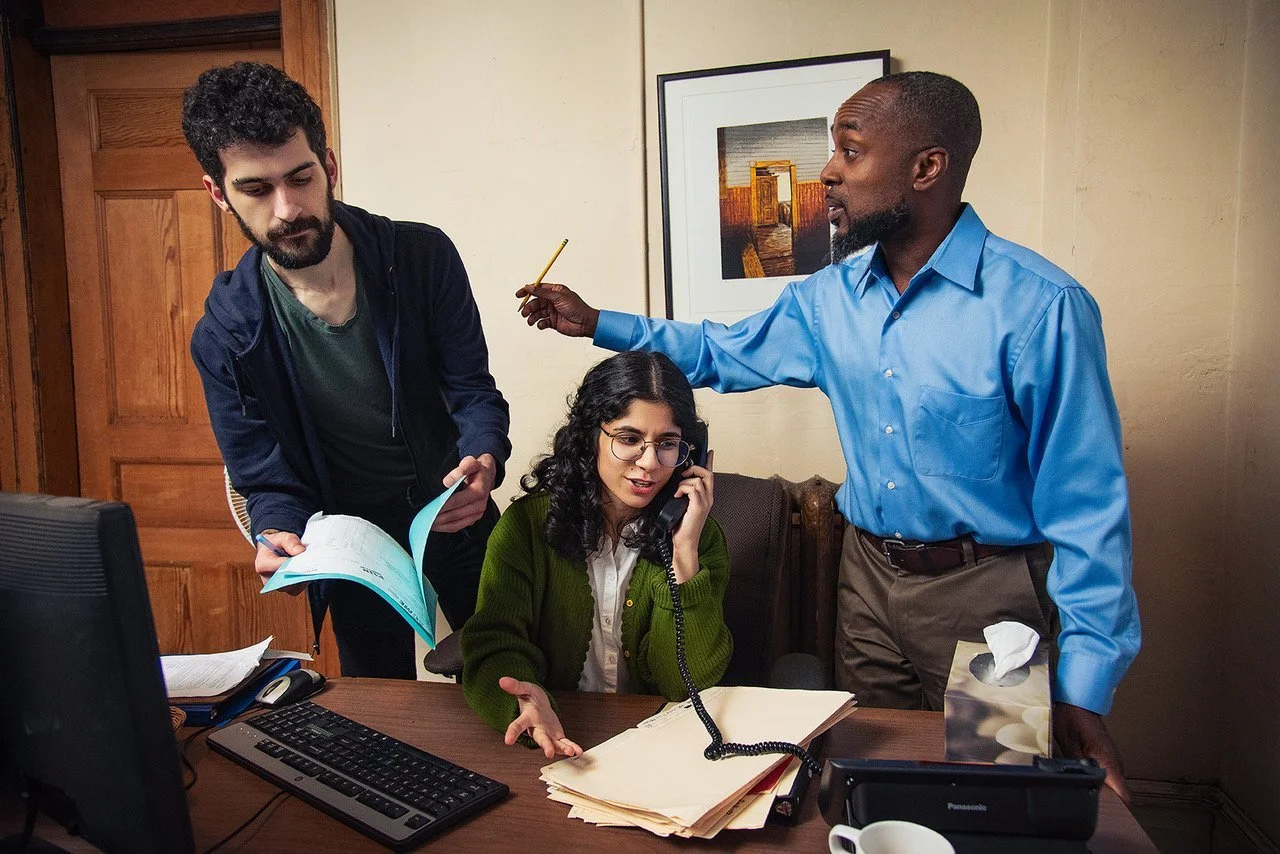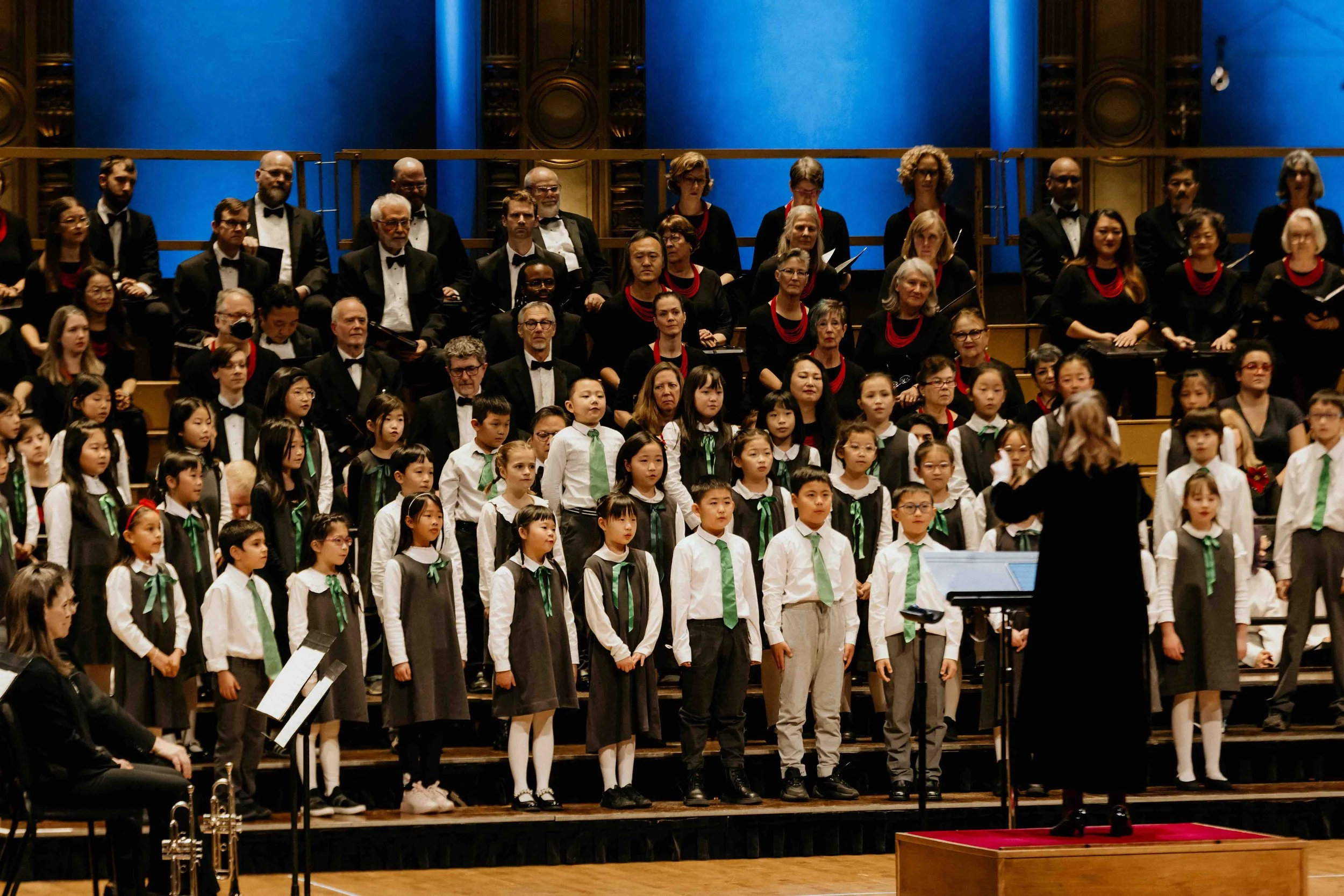Diverse experiences and shifting pressures of Syrian refugee crisis converge on The Frontliners
Enriched by a team of cultural consultants, Zahida Rahemtulla’s new play offers new insight on an urgent chapter of recent Canadian history
(From left) Francis Dowlatabadi, Janavi Chawla, and Adrian Neblett in The Frontliners. Photo by Chelsey Stuyt
Blackout Art Society, the Firehall Arts Centre, and Vancouver Asian Canadian Theatre present The Frontliners at the Firehall Theatre from May 1 to 11
WHILE PLAYWRIGHT AND educator Zahida Rahemtulla draws inspiration from her family’s migration stories, her new play is less a personal account than a collective act of storytelling. True to its title, The Frontliners emerged from an exploratory process with a team of diverse voices, a process that highlighted the collaborative culture of theatre.
The Frontliners is set to have its world premiere at the Firehall Arts Centre on May 1, in partnership with Blackout Art Society and Vancouver Asian Canadian Theatre. First developed through the Arts Club Theatre Company's Emerging Playwrights’ Unit in 2019, the comedic drama received further support from Playwrights Theatre Centre, and was recognized with the Vancouver Fringe Festival’s New Play Prize.
The story takes place during Canada’s 2016 resettlement initiative, and centres around three frontline employees as they work to find shelter for Syrian refugees in the face of Vancouver’s housing crisis and an extremely compressed timeline.
“In order to pull that off, the project relied on workers across Canada to welcome newcomers and temporary accommodation sites across the country,” Rahemtulla says in a Zoom call, alongside journalist and documentary producer Oussayma Canbarieh and musical artist Farouk Alsajee. “I worked in the [immigrant and refugee non-profit] sector from 2016 to 2021, and I found that a lot of the larger conversations around migration, privilege, race, workplace mobility can be so particular. Thinking about these issues and these different intersections made me want to write this play.”
The Frontliners not only draws on Rahemtulla’s own experience on the settlement frontlines, but also incorporates insights from cultural consultants to authentically reflect the diverse and complex experiences of equity-seeking groups, in particular refugees. The consultants include Alsajee, Canbarieh, playwright Aksam Al-Yousef, photographer Aya Adra, and Majd Agha, one of the earliest Syrian refugees to settle in Canada.
“It’s extremely important to have cultural consultants on any project that is talking about a snippet of history, because this is a snippet of our Canadian history,” says Canbarieh, who assisted as an interpreter during the resettlement initiative. “The urgency at the time was very prominent, and it’s reflected in the play.”
Before The Frontliners, Rahemtulla gained recognition for her debut play The Wrong Bashir, a comedic drama that examined generational and cultural tensions within the Ismaili community. With family lineages from East Africa and Uganda, she brings aspects of her family’s migration experience to the writing, noting the communal bond that can form through shared experiences.
“My father was a refugee,” she explains. “I grew up with family members speaking about that experience. Although it was very hard to start over, one thing they do remember very fondly was how they had to rely on each other. When I worked in the frontline sector, I could see a little bit of what they were talking about, but with a different community.”
Similarly, Alsajee is drawn to The Frontliners’ story in ways that are both personal and professional. The Iraqi-born musician fled to Damascus at age 15 and lived in Syria for nine years, before moving to Canada in 2015 as war once again disrupted his refuge. He began volunteering as an ESL teaching assistant in B.C., and later worked as a youth settlement worker during the Syrian refugee initiative.
“I was able to work on the music side in a way where it could add to the atmosphere of the play, especially reflecting themes like nostalgia, feelings of loss and of missing home,” says Alsajee, who collaborated with composer Ruby Singh to create the play’s original score.
“I left Iraq to escape conflict and to seek haven in Damascus, and one semester before graduating [from university], I had to come to Canada. Even though I’m not Syrian, I grew up in Syria, so a major part of my personality is connected to it. I also worked with Syrian youths, I heard the stories, and I saw how this conflict impacted generations. I try to add my experience because it has different dimensions to the way we could think of any conflict.”
Through diverse voices, The Frontliners shines a light on the multiplicity in the Syrian community, and how refugee experiences can shift across identity, timing, and broader social contexts.
“Syrians are extremely diverse,” says Canbarieh, whose father immigrated to Canada from Syria. “I would say one very prominent stereotype is that refugees are not educated, or they are all poor, which is not at all the case. It’s really difficult for any person to leave their country and integrate. The human stories behind the statistics and headlines are definitely worth mentioning.”
To further expand the conversation, a panel discussion with Rahemtulla and the cultural consulting team will be held at the Firehall Arts Centre on May 4, facilitated by the show’s director, Derek Chan. Through this open collaborative process, Rahemtulla hopes to learn from this premiere production and the conversation that it generates.
“It’s a big responsibility,” says Rahemtulla. “I feel very lucky with the collaborators I’ve had so far, and I think after [this production] it’ll be an ongoing process and the work will continue.” ![]()
























